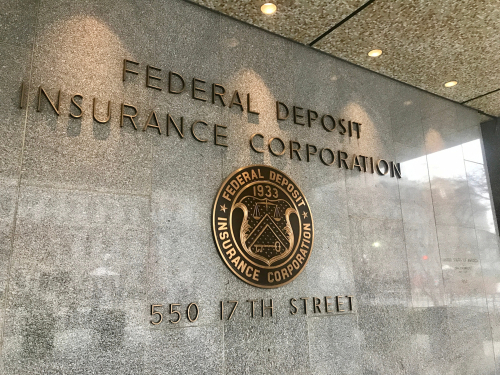The Federal Deposit Insurance Corporation (FDIC) proposed a rule that would amend its regulations under the Change in Bank Control Act.

Specifically, the proposed rule would require the FDIC to be notified in advance for certain acquisitions of voting securities of FDIC-supervised institutions, whether such investments are made directly in the institution or indirectly through a holding company.
Generally, under the Change in Bank Control Act, no person may acquire control of an insured depository institution without providing at least 60 days prior written notice to the appropriate federal banking agency.
However, the FDIC’s current regulations exempt transactions from this notice requirement in cases where the Federal Reserve Board reviews a Change in Bank Control notice, and the FDIC has forgone the notice requirement when the Federal Reserve has accepted “passivity commitments” from an investor.
In essence, this proposed rule would remove the exemption, override the practice, and request further public comment regarding the FDIC’s overall approach to changes in control affecting FDIC-supervised institutions. It would also enable the FDIC to consider the full range of options available to it under the Change in Bank Control Act.
“I believe it is important that the FDIC, as the primary federal regulator of state non-member banks, closely review who is exercising direct or indirect control over its supervised institutions,” FDIC chairman Martin Gruenberg said. “The proposed regulatory change would remove the existing exemption and harmonize the FDIC’s approach, giving the FDIC the ability to request a notice of change in control or negotiate passivity commitments with a proposed acquirer, notwithstanding whether the Federal Reserve Board reviews a notice or accepts passivity commitments pursuant to its legal authority with respect to depository institution holding companies.”
The rule was proposed by Consumer Financial Protection Bureau Director Rohit Chopra. He called the Change in Bank Control Act a guardrail that allows banking agencies to block controlling investments in banks if the deal would undermine competition, have a negative impact on the Deposit Insurance Fund, or wouldn’t be in the public interest.
“In America, we don’t let just anyone own a nuclear power plant or operate a bridge. Certain sectors of our economy are critical infrastructure for our country,” Chopra said. “Our society and democracy couldn’t function without them. There’s no question that our economy and society rely on banks just like we rely on our power grid and our transportation network. Congress put in place guardrails to ensure the ownership and control of this critical infrastructure promotes resiliency and is free of conflicts of interest.”
Public comments on the proposal are due 60 days after publication in the Federal Register.
The FDIC also acted on several other matters, including brokered deposits, industrial loan companies, resolution plans, and uninsured deposits.
The actions were applauded by Better Markets, a nonprofit organization created to promote public interest in the markets.
“We applaud the FDIC’s actions today to better protect Main Street Americans and businesses from destabilizing ‘hot money’ brokered deposits, the inappropriate mixing of commerce and banking, the failure to have effective resolution plans, the questionable outside control of banks, and the well-known risks from uninsured deposits,” Shayna Olesiuk, director of banking policy at Better Markets, said.
On brokered deposits, Olesiuk said the 2020 brokered deposits rule created a giant loophole that has been exploited by fintech and crypto firms at the expense of the safety of the banking system.
“The loophole was unjustified, dangerous, and increased the likelihood of liquidity crises, bank failures, and taxpayer bailouts including what we saw in spring 2023. Today, the FDIC Board decided that it would reconsider the definition of brokered deposits, which skyrocketed after the 2023 banking crisis and reached an all-time record high of $1.3 trillion in fourth quarter 2023. We support making the definition of brokered deposits more inclusive of all types of risky ‘hot money’ that could amplify or aggravate a crisis and impose supervisory penalties on banks that overly rely on brokered deposits,” Olesiuk said.